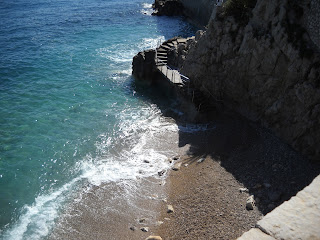What an incredible 10 days! I had high expectations when all
33 of us crowded onto the bus at 6 am on Tuesday, but I never thought it would
surpass those expectations. Tour was incredible. We visited 9 cities in 6 different
countries in 10 days.
The first day, we visited a cave in Slovenia. No one was
particularly excited about it, but the cave turned out to be gorgeous. We rode
in a mini roller coaster through the caves and listened to the tour guide after
we stopped to walk around.
That night, we drove to a small city outside of Venice and
spent our first night in a hostel there. We ate pasta in Italy and failed to
get any sleep because we were all so excited for the next day.
In the morning, we hopped on a train and traveled to the
isolated city of Venice. We had a guided tour for a few hours and then we had a
few hours of free time to shop and explore. We tried the gelato and went shopping
before taking a gondola ride through the watery streets.
The best part had to
be the view from the tower in the city center.
We spent the night in the hostel near Venice before heading
over to Florence in the morning. Florence was the exact opposite of the small,
twisty streets of Venice. Florence was wide open and felt more comfortable to
me. We saw Cross Church, where the bodies of Galileo, Machiavelli, and Michelangelo
are held in our guided tour. In our free time, we found an amazing library by
accident and while we never actually made it to our original destination, it
was still totally worth it.
We spent the night in a hostel in Florence and woke up early
to go to Rome in the morning. We arrived around midday and visited the Vatican.
We didn’t have a guide, so we could do anything we wanted. I climbed to the top
of the Basilica because one of the Rotary guides recommended it and said the
line was shorter than normal.
We stayed in a hostel on the outskirts of Rome and went
straight to the Colosseum the next morning. We had a casual guided tour of the
Colosseum and the Pantheon and then we had a lot of free time. I didn’t love Rome,
The city felt like a bigger, dirtier version of Florence and while the ancient
sights were incredible, the city itself didn’t impress me.
We stayed a second night in Rome and drove to Pisa the next
morning. Our guided tour was short and to the point. I really liked the Square
of Miracles, where the tower is, and I took some of my best pictures there.
Pisa also surprised us with a huge flower market.
We slept in a hostel in Pisa and prepared for the long drive
to Monaco in the morning. The drive to Monaco was beautiful. There were beach
towns every few kilometers, but we all gasped when we saw Monte Carlo.
We had time to do whatever we wanted and some people went to
find the casino. I took pictures of part of the Formula 1 racetrack, then spent
most of my time at a small hidden beach. I missed the beach so much. I missed
the ocean and the sound of the waves. We hung out and joked that we were the
poorest people in Monaco.
We didn’t sleep in Monaco, instead we drove to Nice, in the
south of France to spend the night. A lot of people decided to go swimming that
evening, but I know the water would be crazy cold.
The next day, we could do whatever we wanted. We could take
a bus back to Monte Carlo or to Cannes, or to other, smaller cities, or we
could explore Nice. I hung out with my Japanese friend and we explored as much
of Nice as was humanly possible. We went into every store that looked
interesting and explored the twisty streets of the old town. We spent hours at
the beach. Nice was easy to explore. I liked the way it felt to walk around and
I felt like I could live there.
We spent a second night in Nice and drove to Luzern,
Switzerland in the morning. The drive was long and we didn't get much time in
Luzern. People bought Swiss chocolate and Swiss army knives. I couldn’t believe
that you could walk down the street and see the gorgeous mountains at the same
time.
We slept in Luzern and made the short drive to Innsbruck,
Austria the next day. We went straight to the 4-star hotel, which was owned by
a Rotarian. We were allowed to explore the city until 10 at night. Innsbruck
was really fun to explore because it was so different from all the Italian
cities we’d seen.
We spent one night in the hotel and woke up early the next
day to make the long journey back to Budapest. We were on the bus for 10 hours
that day, only making short technical stops at gas stations. We were all glad
to be back in Hungary. All tour, we’d been saying “thanks” and “sorry” in
Hungarian because we are so used to it by now. It was so frustrating to have
this language that we couldn’t use. It was refreshing to be speaking Hungarian
again and to eat the Hungarian food.
Euro tour was an amazing experience and I’m so grateful that
I could go. I only have two months left on my exchange and almost every weekend
is packed full of new adventures.
-Alina














































